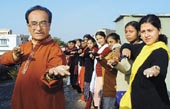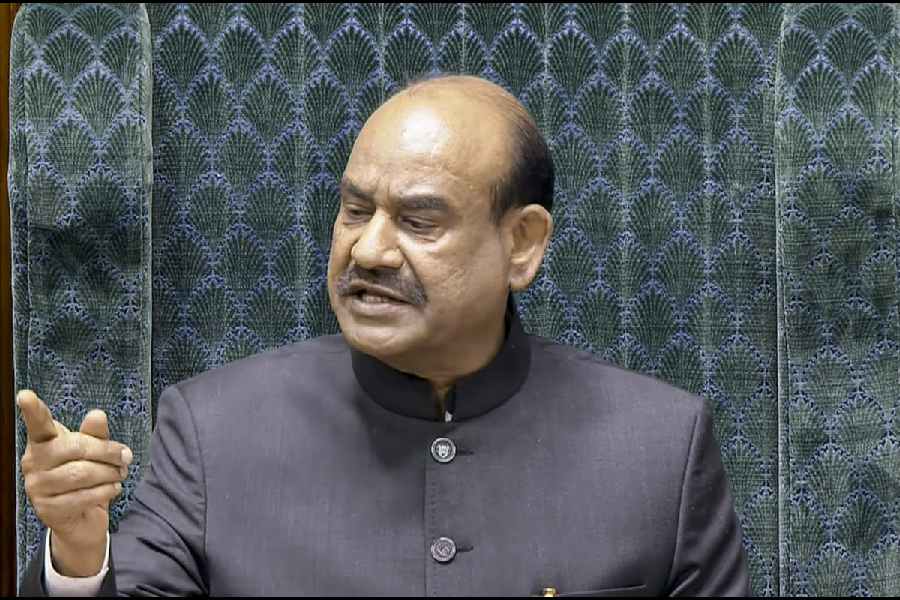 |
| Bipul Das with his students |
You tend to take for granted people you love and admire. You are convinced that they will always be around. Yours truly is also one of those who never learn their lessons.
Four years ago, when I moved to Calcutta, I was surprised to receive a call from Ain Rashid Khan, an IPS officer from the West Bengal cadre, a poet and a film-maker.
He had made a memorable film, The Seventh Man, on the Muslims of Calcutta. Cine Society, Ranchi, had screened the film and invited him over to answer questions put by members.
The screenings then were held in the morning and by 11 am the hosts and the guest found themselves to be free. Since his train was only late in the evening, a few of us undertook to take Rashid Khan around.
Half-a-day spent with him decades ago, memorable though the hours were, did not entitle me to claim an acquaintance with him. But he seemed familiar with my career, was extremely warm and insisted we meet over a drink. We never did though he called up frequently enough. And before I could find time to spend a leisurely morning or evening with him, he was gone, hours after he collapsed at a restaurant. As I sit staring at the computer screen, I wonder what Bipulda wanted to tell me when I last visited Ranchi in June. He had left a message at the hotel, called up The Telegraph office and finally managed to catch me just before I was to check out.
“I have so much to tell you; the next time you come to Ranchi, you must come home,” Bipulda admonished. Nothing had changed. He was as warm as ever, as affectionate and as child-like as I had known him. But before I could pay that visit, he is gone, just days before my visit. Why does it happen? Every time a dear one departs, the heart wrenches and we realise how many unasked questions we still retain in our heart.
Now that he is no more, I am sure to visit his house. It will of course not be the same. Had he been alive though, I would have probably found an excuse to defer the meeting during my next visit.
There is no forgiveness but I hope I am forgiven. My memory of Bipulda goes back to the mid-Sixties. I was a skinny 10-year-old perhaps when my parents discovered that I had some talent for dancing. I was picked up by the scruff of my neck and taken to Bipulda, who had been commissioned to train children of the neighbourhood in Kathak.
I liked my playtime more and resented this “girlish” occupation with dance. My resentment grew when I learnt that I had been pushed into the group because they had fallen short of the required number. Being the only boy in a group of older girls was another handicap. All said, it was not something I looked forward to.
But I was fascinated by Bipulda. His limbs and waist appeared to be made of rubber. His eyes were expressive and showed anger, affection and compassion in quick succession. With effortless ease he would demonstrate the differences in the look the mother would give to the child, the devotee to God and the Gopis to Krishna. What was more, he treated all of us as equals. He never laughed at us. He was always laughing with us and as long as he was with us, he had no time for the adults.
My dancing lessons did not continue for very long. A year or so later, Bipulda one day announced that the Governor would be attending a function at Welfare Centre Hall, which was located opposite the GEL Church Complex, and we had been invited to present a few “dance items”. I was learning a “Shikari dance” at the time and enjoying it too. But I developed cold feet when it was explained that I had to be bare-bodied, in my formal costume.
As self-conscious as a 10-year-old could be about his skinny ribcage, I broke out into cold sweat and refused to go back to the dance lessons. Even Bipulda could not make me change my mind.
Years later, when my hair had thinned and I had grown a paunch, Bipulda still looked the same. He never missed an opportunity to introduce me either, as one of his former pupils, as his eyes glinted mischievously. I had passed out of college and had got into the serious business of journalism when Bipulda was still making the rounds of schools and clubs, teaching children how to dance with the same passion. He was always in a hurry, would stop his scooter to talk but would soon realise that he had to reach somewhere and regretfully leave us. Every time we organised a function to raise funds for flood or drought relief or at the annual conference of the Institute of Journalists, he was always available to organise the cultural function at short notice.
For 17 long years I have been out of Ranchi and had lost touch with him.
Short visits to Ranchi of late were becoming too crammed with work-related meetings to look up even friends. On these visits, honestly speaking, the thought of Bipulda never crossed my mind.
But as I write these lines on a Saturday evening, I feel a void. An old and dear link to my roots is lost forever. It is difficult to believe that Bipulda is no more. Memories of his rare child-like smile tug the heart-strings as I silently intone, Bipulda, Rest In Peace.











